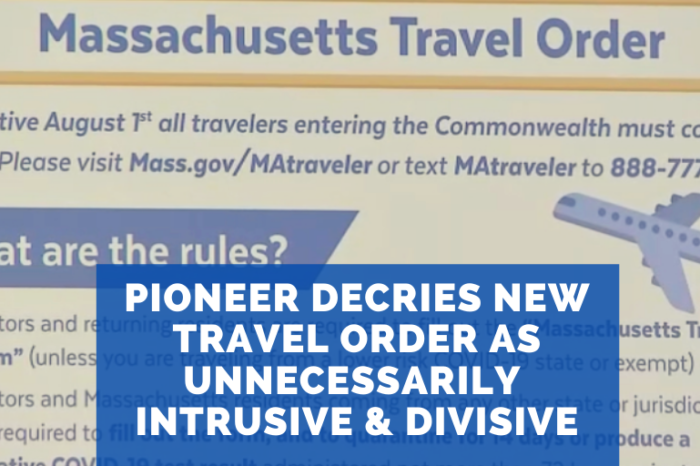Pioneer Decries New Travel Order as Unnecessarily Intrusive and Divisive
Pioneer Institute is disappointed at certain extreme aspects of Governor Baker’s executive order that goes into effect tomorrow. The order requires all travelers entering or returning to the Commonwealth from all but eight “lower-risk” states to fill out a Massachusetts Travel Form and quarantine for 14 days unless they can produce a negative COVID-19 test administered no more than 72 hours prior to arrival.
The order is reminiscent of those that many states issued prohibiting travel from New York during the spring, when that state was overwhelmed with COVID cases, and seeks to deflect blame for the outbreak when we should be focused on overcoming it.
“Asking residents to notify local boards of health and dial 211 to report citizens who don’t comply, and urging employers to ‘strongly discourage’ employees from vacation travel to states not deemed lower risk is a far cry from the personal freedoms that are the cornerstone of American democracy,” said Pioneer Executive Director Jim Stergios.
Pioneer believes the new order is:
- Epidemiologically questionable
- Harmful to our hardest hit industries and their employees
- Divisive and deflects from real solutions
Finally, we believe there is a better way forward that is more likely to have beneficial impact
Epidemiologically questionable
Massachusetts’ travel restriction affects many states that have infection rates far below the Bay State’s, such as Montana and Wyoming (See the CDC’s site listing Covid-19 cases by state). Many western states that are faring better than Massachusetts are still subject to the Commonwealth’s new restrictions. New York’s policy is more based on science. The Empire State is restricting travel from the 31 states that have infection rates higher than their own.
Harmful to our hardest hit industries and their employees
The Commonwealth’s retail, restaurant and hospitality industries employed nearly 800,000 people in 2018 and have borne the brunt of the impact from forced business closures and other restrictions. The Institute supported those actions through the end of May and fully supports responsible reopening procedures, including mask wearing, social distancing and many other executive branch recommendations. But the new restrictions will have a chilling effect on these already devastated industries, which employ a significant number of younger and economically at-risk residents. During summer and early fall, many of these businesses can focus on outdoor and well-ventilated spaces, and with responsible re-opening procedures can serve customers without increasing transmission of the virus.
Divisive and deflects from real solutions
According to The Boston Globe, before arrival:
visitors must fill out and submit online a “Massachusetts Travel Form”… Local boards of health, or the state contact tracing collaborative, will monitor those in quarantine. Residents can report suspected violators to the board of health, which will levy any fines.
Hotels and Airbnb hosts will be responsible for notifying visitors of the rules.
During his press conference on July 24th (see 20:28), the governor explicitly underscored that neighbors can report on neighbors, “notify[ing] either their local Board of Health or the Commonwealth’s Department of Public Health or they can call 211.”
Travelers from Massachusetts to the 42 affected states must also fill out a Massachusetts Travel Form and submit it to the Department of Public Health. Section 1 of Governor Baker’s order even calls upon employers to “strongly discourage” employees from traveling to states not deemed lower risk for personal travel.
These provisions raise questions about the role of employers in influencing how employees use their personal time, how these forms will be examined and retained, how these new states mandates might affect relevant federal protections, privacy, and the wisdom of policies that pit one citizen against another.
The governor’s travel restrictions create a whole of set of bureaucratic steps and tracking, which require manpower and which are a diversion from aspects of the state’s pandemic response that require significant improvement, including readiness for K-12 school re-openings, testing capacity, and oversight of our nursing homes.
A better way forward
A better approach would be to require that universities test all incoming students from out of state and for the Commonwealth to offer Covid-19 tests to all visitors for a nominal fee. Massachusetts can — and must — do better than blaming “the outsider” and practicing the divisive politics that so obviously poison American society.
Related Media:
The Salem News: “Baker’s COVID-19 travel restrictions panned”
WBUR Week in Review: Police Reform Bill, New Coronavirus Travel Restrictions
Get Updates on Our Education Research
Related Posts






